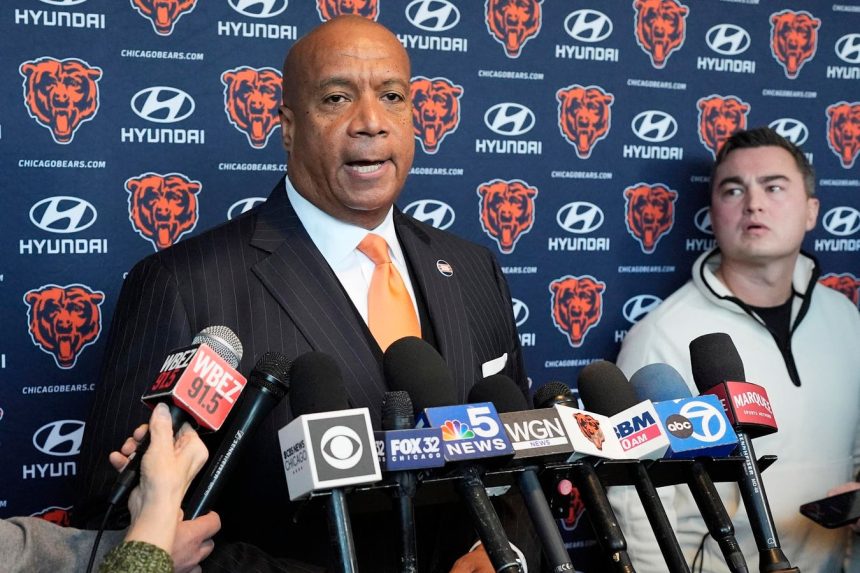The Chicago Bears’ head coaching search, following the mid-season dismissal of Matt Eberflus, has raised eyebrows and reignited familiar concerns about the organization’s decision-making process. Despite General Manager Ryan Poles’ assertion that he will have the final say, the multi-layered interview process, involving team president Kevin Warren, chairman George McCaskey, and others, casts doubt on the extent of Poles’ actual authority. This approach mirrors previous searches that yielded disappointing tenures for coaches Marc Trestman, John Fox, Matt Nagy, and Eberflus, none of whom achieved sustained success. This historical context fuels skepticism about whether ownership truly trusts its football leadership to make the crucial decision of selecting a head coach.
Poles, whose four-year contract reportedly expires after the upcoming season, finds himself in a precarious position. His perceived lack of autonomy within the organization raises questions about his long-term future and undoubtedly impacts the perception of potential head coaching candidates. Warren’s ambiguous response regarding Poles’ long-term status only amplifies these concerns, leaving open the possibility that a new head coach could supersede the GM in the organizational hierarchy. This ambiguity further complicates the search and potentially deters top candidates who desire a clear chain of command and a supportive front office.
The Bears have cast a wide net, targeting a diverse group of candidates, ranging from seasoned Super Bowl winners like Pete Carroll and Mike McCarthy to promising young offensive minds like Ben Johnson and Mike Kafka. The inclusion of Mike Vrabel, a four-time Super Bowl champion as a player and experienced head coach with the Tennessee Titans, further underscores the team’s ambition to secure a high-profile leader. However, securing interviews with some of these high-demand candidates has proven challenging, notably with McCarthy, whose current contract with the Dallas Cowboys complicates the process. The competitive landscape further intensifies the challenge, as five other NFL teams are also vying for head coaching talent.
The Bears’ pursuit of experienced coaches like Carroll and McCarthy signals a potential shift in philosophy, possibly prioritizing proven success over the potential of younger, less established candidates. Carroll’s extensive experience and Super Bowl victory with the Seattle Seahawks, combined with McCarthy’s Super Bowl win with the Green Bay Packers, make them attractive options for a franchise desperate for a return to winning ways. However, landing a coach of this caliber might require concessions regarding organizational structure and control, potentially granting the new coach greater authority than previous hires. This raises the question of whether the Bears are willing to fundamentally alter the balance of power within their organization to secure a proven winner.
Beyond the established names, the Bears’ extensive candidate list also reflects a willingness to explore rising stars in the coaching ranks. The interest in coordinators like Ben Johnson, Aaron Glenn, Mike Kafka, Brian Flores, and Todd Monken highlights the team’s commitment to evaluating a wide spectrum of offensive and defensive philosophies. This approach allows the Bears to consider innovative schemes and potentially identify a coach who can effectively maximize the talent on their roster. The inclusion of David Shaw, a former Stanford head coach with a strong collegiate background, further diversifies the pool of candidates and suggests a willingness to consider unconventional options.
The expansive search, while demonstrating thoroughness, also underscores the pressure on the Bears to make the right choice. The involvement of multiple individuals in the interview process, including McCaskey, Warren, Poles, and other front-office personnel, aims to ensure a comprehensive evaluation of each candidate. However, this complex structure also carries the risk of internal disagreements and potential power struggles. The limited role of Assistant GM Ian Cunningham, due to his consideration for other GM positions, adds another layer of complexity to the search. This dynamic raises questions about the cohesion and stability of the front office, factors that could influence the decision of potential head coaching candidates. The Bears must carefully navigate this complex landscape to select a coach who not only possesses the requisite skills and experience but also fits within the organizational structure and culture. The organization’s history of short-lived coaching tenures underscores the importance of finding a leader who can establish a long-term vision and build a sustainable winning culture.



